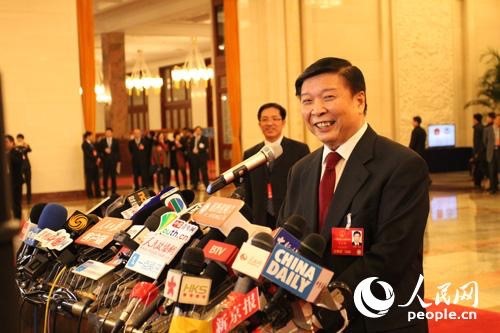


Jiang Daming, Minister of Land and Resources (MLR), gives an interview at the Great Hall of the People on March 9. (Photo: People’s Daily Online)
Housing market will stabilize with the introduction of differentiated and localized policies in cities where home prices rise quickly, Minister of Land and Resources (MLR), Jiang Daming, told reporters on Wednesday.
His comments came as a recent surge in home prices in some first-tier cities has triggered concern. After this year’s Spring Festival, both transaction volume and prices in cities like Beijing, Shanghai, and Shenzhen have spiked rapidly, offsetting market confidence provided by policies launched last year.
According to Jiang, many deputies at the current “two sessions” are proposing to control soaring prices by increasing land supply. The Chinese government will take steps to follow these suggestions, including introducing localized measures for cities with rising prices.
Jiang said that a package of detailed plans may involve ensuring the supply of government-subsidized housing projects; increasing land supply through managed sharing of the government’s land reserves; and making better use of unused urban land.
Inefficiently-utilized land should be re-developed, and shanty towns renovated, he noted, adding that efforts will also be made to perfect land bidding, auction and listing policies as well as to crack down on irregularities in transactions.
Cities including Beijing, Shanghai and Shenzhen have recently tried to use policy tools to cool the housing market, in the process raising questions about a possible shift in the government’s approach to land management and to the expansion of urban development boundaries.
Addressing such concerns, Jiang vowed that home prices will cool down as destocking occurs, and a healthy property market will ultimately take shape.
Chen Zhenggao, Minister of Housing and Urban-Rural Development, also told the press that he is confident that the home prices will slip in first-tier cities.
Guo Naishuo, a National People's Congress (NPC) deputy, said that the price surge in first-tier cities could be attributed to spillover effects from intensive destocking policies and the further release of pent-up demand.
Guo also suggested that a siphon effect is taking place in first-tier cities, as they absorb capital and resources from other less developed cities.
Irrational price rises could undermine a healthy real estate market, Guo said, noting that hotter markets could attract purchasing power from third- and fourth-tier cities, further increasing the difficulty of destocking in those smaller urban areas.
“The current relatively abundant monetary liquidity cannot be allowed to flow through into overinflated home prices in major cities,” Li Daokui, a member of Chinese People's Political Consultative Conference National Committee told the media. Li suggested that the forces propelling the current round of real estate speculation make it even more extreme than previous rounds.
Financial markets as well as the currency rate must be stabilized, said Li. Such stability is vital to ongoing efforts to restructure debt, eliminate outdated production capacity, and clean up bad debt.
 Beautiful Kapok flowers bloom in Hainan
Beautiful Kapok flowers bloom in Hainan Eye-catching beauties in Chunxi Road of Chengdu
Eye-catching beauties in Chunxi Road of Chengdu Wedding pictures of Wu Qilong, Liu Shishi released
Wedding pictures of Wu Qilong, Liu Shishi released One of world's largest military drills in Saudi Arabia
One of world's largest military drills in Saudi Arabia Iron lady or goddess? Sportswomen's dress show
Iron lady or goddess? Sportswomen's dress show Versatile female soldiers in military camp
Versatile female soldiers in military camp Top beauties in Chinese provinces
Top beauties in Chinese provinces Follow me to my Weibo
Follow me to my Weibo Chinese ships keep close watch on U.S. Navy aircraft carrier strike group in S. China Sea
Chinese ships keep close watch on U.S. Navy aircraft carrier strike group in S. China Sea Top 20 hottest women in the world in 2014
Top 20 hottest women in the world in 2014 Top 10 hardest languages to learn
Top 10 hardest languages to learn 10 Chinese female stars with most beautiful faces
10 Chinese female stars with most beautiful faces China’s Top 10 Unique Bridges, Highways and Roads
China’s Top 10 Unique Bridges, Highways and Roads How prosperous is the city Beijing really?
How prosperous is the city Beijing really?  China will further open market for foreign firms this year: report
China will further open market for foreign firms this year: report  Influenced by Ai Weiwei, a remote village evolves into a lab for performance artists
Influenced by Ai Weiwei, a remote village evolves into a lab for performance artists  Western speech freedom not fit for China
Western speech freedom not fit for China Day|Week